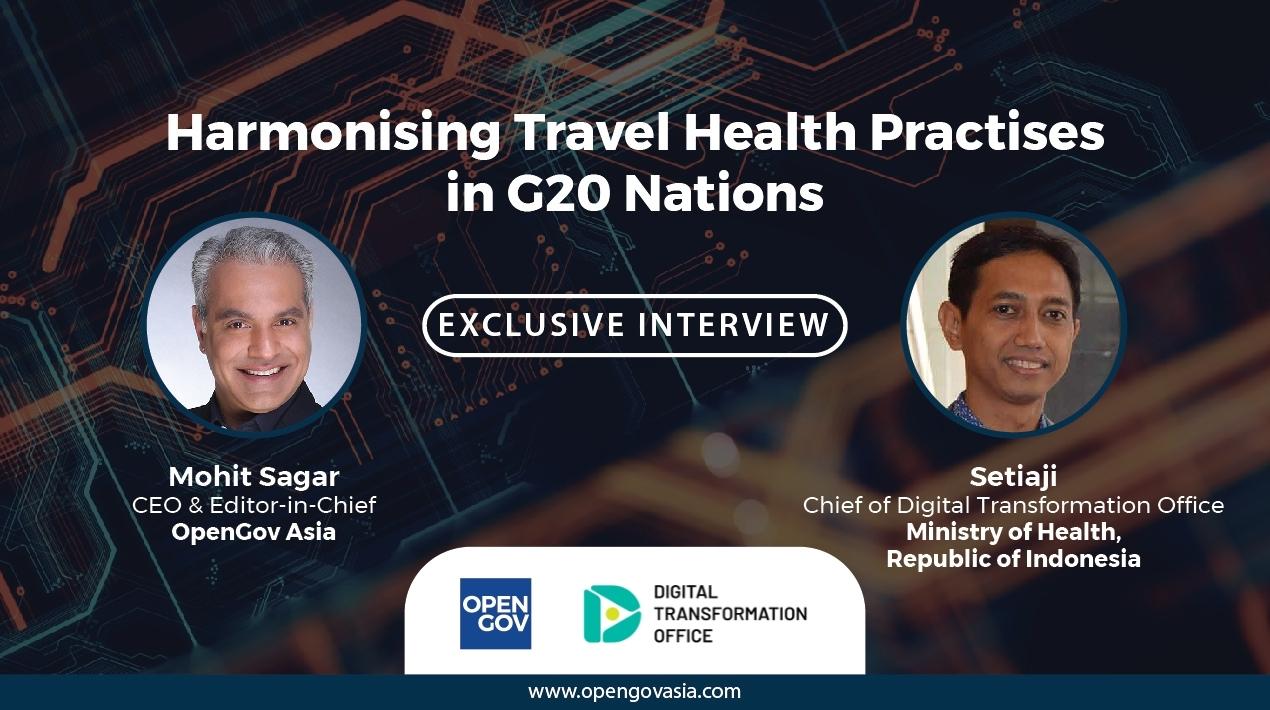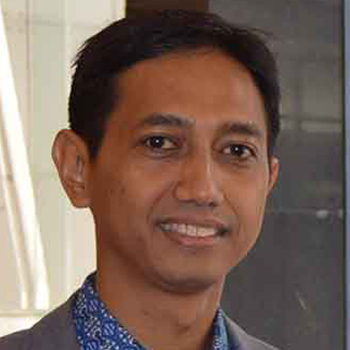
As the chair of the Group of 20 major economies (G20), Indonesia has begun discussions with members on standardising health norms for travel, emphasising the significance of harmonising rules and technology as global travel resumes in earnest.
Standardising health regulations for travel is crucial as certifications issued in one nation may currently be incompatible with one another, making international travel more of a hassle than it has to be.
Indonesia recommends that standardisation follow COVID-19 regulations of various nations, including whether vaccines, tests, or testing authorities would be recognised. It is also proposing streamlining rules for travel between the European Union and the Association of Southeast Asian Nations (ASEAN).
 In an exclusive interview with Mohit Sagar, CEO and Editor-in-Chief of OpenGov Asia, Setiaji, Chief of Digital Transformation Office at the Ministry of Health, Indonesia explained the G20 health protocol standardisation and how will the G20 member countries benefit from this.
In an exclusive interview with Mohit Sagar, CEO and Editor-in-Chief of OpenGov Asia, Setiaji, Chief of Digital Transformation Office at the Ministry of Health, Indonesia explained the G20 health protocol standardisation and how will the G20 member countries benefit from this.
Technology’s Role in Healthcare
Organisations in the public and private sectors have accelerated their digital transformation to combat the challenges caused by the global pandemic. The adoption of technologies like IoT, AI and robotics has grown significantly because of the digital transformation journey, catalysing beneficial change.
“Technology and related systems can help find diseases and stop them from spreading, but the most important thing is to keep diseases from happening in the first place,” says Setiaji. “As an initial response, the government can use a variety of new technologies and Indonesia has already greatly minimised the impact of the pandemic using technology.”
The potential advantages that digital transformation offers have been carefully studied by the Indonesian government. The country is eager to deploy the use of digital technology to involve citizens in governance, economic recovery and overall development.
Indonesia’s rapid urbanisation makes it an ideal candidate for smart city innovations. The country is unique in its rapidly depleting coal reserves, shift away from being the world’s largest recycler of plastic waste and push to bolster economic growth through digitalisation, with incentives to encourage people to build more sustainable cities.
“Healthcare is a basic need for Indonesians, as it is for the whole world,” agrees Setiaji. “The Indonesian Ministry of Health is focusing on accelerating the nation’s healthcare system for the benefit of the public.”
The nation recently unveiled its first digital health blueprint, laying the groundwork for the country’s digitalisation of health services to expand inclusive health care coverage for its 270 million citizens. The blueprint guides the government to utilise digital technologies to advance its national objective of offering universal, affordable, equitable and high-quality care to all Indonesians.
The digital health blueprint lays a foundation for developing Indonesia’s enterprise architecture for health technology. It is supported by important pillars like the digital integration of patient and healthcare provider health information and the coordinated development of digital health infrastructure.
Setiaji, who oversees the digital and information team, says that improvements in healthcare technology are being used to modernise the healthcare sector and help close the gap between urban and rural areas. Moreover, the Indonesian government is aggressively addressing the country’s health data system.
New technologies like smartphone apps and other types of telemedicine are improving the quality of health care in Indonesia and making it easier for people in the most remote parts of the archipelago to get services.
A great example was the contact tracing mobile app – PeduliLindungi – used as part of a plan to stop COVID-19 from spreading further in the country.
G20 Health Protocol Standardisation
In its role as president of the Group of Twenty (G20), Indonesia has initiated discussions with the group’s members to establish standardised health protocols for international travel, as nations gradually cautiously lift border restrictions.
“We require a COVID-19 standard vaccine passport to recognise each other’s countries and to move and recover more quickly from pandemics,” says Setiaji. “Synchronised, harmonised global health protocols are required for safer international travel and to expedite the permanent social and economic recovery.”
Indonesia is eager to make sure that safe and healthy travel procedures are the same everywhere, especially when it comes to the recognition of COVID-19 vaccine certificates. A plan was recently announced to make the digital COVID-19 vaccine certificates more uniform by using a universal verifier made to WHO standards. The system is web-based and can be used on any device. Each country does not have to change the way QR codes are used or the system itself.
Health guidelines vary from country to country, with some being stricter than others. So, each country has the freedom to use the health protocols that are right for them, with clear and universal rules. This strengthens the global health system and makes it easier to travel between countries.
In addition, health protocols need to be synchronised so that health information can flow between systems. This process is likely to start in the countries that are part of the G20 and then spread to other countries. They are also looking for a third party to run the system independently.
If successful, Setiaji believes that similar regulations can be made by the ASEAN countries. “This vision isn’t just for the G20 countries; it’s also for the rest of the world. To this end, we have already begun building partnerships with other countries.”
Data in the Healthcare Space
Digitalisation is reshaping the way the Healthcare sector interacts with healthcare professionals, medical data is shared or decisions are made in the context of treatment and outcomes. Some examples of healthcare digitalisation are Artificial Intelligence-powered medical devices, telemedicine, blockchain, remote-patient monitoring and electronic health records.
The main aim of healthcare innovation is to streamline medical professionals’ work, optimise medical software systems, reduce human errors, improve patient outcomes and lower costs through integrated web and mobile experiences. However, to get the best results for the patients, it is necessary to share their data. There are ways to do this while maintaining patient privacy and data security, according to Setiaji.
Setiaji emphasises that security by design is needed in creating a new, more secure hardware and software ecosystem. This will radically update the foundation of the insecure digital computing infrastructure. It is also needed security standards in which the principal objective is to reduce the risks, including preventing or mitigating cyber-attacks.
The adoption of information systems in public health management in Indonesia aims to manage the data properly to improve the effectiveness of the provision of health services. “We also work with other government agencies and partners to secure data in the healthcare sector,” Setiaji reveals.
Data in the healthcare space needs to be always available, thus as part of the country’s health technology transformation pillar, Indonesia’s Health Ministry recently launched the Indonesia Health Services platform.
The SATUSEHAT platform aims to support the implementation of other transformation pillars of Indonesian health systems, such as primary services transformation, referral services transformation, health resilience systems transformation, health financing systems transformation and human resource transformation in the health sector.
This comes as the ministry aims to integrate the platform into 8,000 health facilities across the country by the end of this year.
For the healthcare industry to pursue digital transformation, Setiaji believes the entire nation must have a clear understanding of its mission and vision. The road to successful digital transformation is paved with courageous leadership decisions, political consensus and the support of the population at large. “Collaboration is also essential, as the transformation process cannot be carried out by a single individual or party.”
Setiaji is convinced that the digital transformation of Indonesia’s healthcare industry within the next three to five years is possible by establishing a solid foundation within the healthcare system. His goals include producing more health mobile apps for public accessibility, improving the health policy and system, and establishing businesses with unicorn status that are growing rapidly. He is confident that the future of healthcare and patient outcomes in Indonesia is bright given the nation’s focus and dedication to serving its citizens.
















